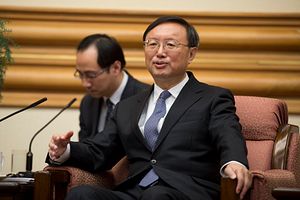The 19th Party Congress of the Chinese Communist Party this year was marked by many remarkable events. The ushering in of a “New Era” in Chinese socialism and General Secretary Xi Jinping’s eponymous theoretical contribution to the Party Constitution – the first by a living leader since Mao Zedong – alone made the Congress a noteworthy one. The band of veterans entering the Politburo’s Standing Committee – the Party’s highest governing body – similarly surprised many, and fanned already furious speculation that Xi is planning to smash convention and extend his tenure beyond the customary ten years. Just as significant was Xi’s ambitious foreign policy, as outlined in his main address, which emphasized “striving for achievement” and the construction of a “community of common destiny” as two of China’s guiding foreign policy concepts.
These surprises, and others not mentioned here, will undoubtedly influence China’s foreign policy for years, if not decades, to come. Nevertheless, this year’s Congress also saw plenty of unremarkable elements, many of which suggest an almost paradoxical sense of constancy – particularly on the international stage. Indeed, while it is still too early to tell definitively, personnel changes within the Party reflect satisfaction with the leadership’s international performance over the last five years and suggest the country’s course will continue along the same path of increasing engagement overseas. Indeed, “continuity” seems to be the theme of the Congress, as many of the main diplomatic and economic players in the Party and state will stay onboard for another round.
The Party’s foreign affairs team, which mainly consists of negotiators and implementers rather than actual policymakers, remains virtually intact. If anything, China’s diplomats have been awarded a new respect that reflects the country’s rapidly growing profile in international affairs. State Councilor Yang Jiechi, China’s top diplomat and chief of the Party’s Foreign Affairs Leading Group, has not only stayed on, but has been promoted to the Party’s Politburo. This marks the first ascension of a major foreign policy figure to the Politburo since former Vice Premier and Foreign Minister Qian Qichen retired in the early 2000s. Foreign Minister Wang Yi has similarly stayed on the Central Committee. Song Tao, head of the Communist Party’s International Liaison Department, was also promoted to the Party’s Central Committee, as is customary for the office. The International Liaison Department serves as the Party’s diplomatic arm and often serves as a point of contact with foreign political parties.
One new foreign policy figure entering the Central Committee is China’s former Permanent Representative to the United Nations Liu Jieyi – possibly reflecting the importance China attaches to the multinational body. Liu is rumored to be headed to the state’s Taiwan Affairs Office, which was Wang’s own springboard onto the position of foreign minister. Thus, far from charting a new course, the presence of foreign policy veterans in the new Central Committee (and the promotion of Yang to the Politburo) seem to validate the China’s foreign policy and hint at a greater appreciation of foreign affairs from the traditionally inward-facing country
Familiar faces also stack the Party’s economic and financial bench. Minister of Commerce Zhong Shan, who arrived in the position only just this year, has been promoted to the Central Committee. Minister of Finance Xiao Jie, likewise, has renewed his spot in the Central Committee. As general practice, minister-rank officials generally also form part of the Party’s Central Committee. Speculation still remains regarding who will be the next leader of the People’s Bank of China, as current chief Zhou Xiaochuan is scheduled to retire.
Lastly, the return of many of the major players in both the Party and State’s Leading Small Groups serves as another sign of continuity. Because Xi Jinping himself chairs most of the Party’s Leading Small Groups on external affairs, we can expect little deviation in these groupings’ recent trajectories. What few changes may surface will likely originate from reconfiguration of the groups’ chairs and directors, the latter of which oversee the activities of the groups. Yang Jiechi, for example, may be promoted from director to deputy chair of the Party’s Foreign Affairs and National Security Leading Group, to fill the vacancy left by former Politburo Member and Vice President Li Yuanchao. Newly-appointed Standing Committee Member Li Zhanshu may also be promoted to Deputy Chair of the National Security Commission, which is chaired by Xi Jinping, with Li Keqiang as Deputy Chair.
With the retirement of several major players in the state apparatus, the state’s Leading Small Groups are a more likely source of change, albeit mostly domestic. One notable exception is the Belt and Road Leading Small Group. With Standing Committee member Zhang Gaoli’s retirement, the Belt and Road Leading Small Group will need a new chair. New Standing Committee Members Wang Yang and Wang Huning are both likely candidates, as they both have previously served as deputy chairs to the group.
The relatively conventional personnel changes reflected at the close of the meeting contrast greatly with what has otherwise been a historic Congress. A quick glance at the familiar faces of the Central Committee says a lot about we should expect in the immediate future, which is to say, an encore of the previous act. This continuity should be seen as a legitimization of the course the country has taken over the past five years and as tacit approval for its prolongation. China will continue to invest abroad, increase its presence in international institutions and groupings, and will even seize leadership opportunities where it can. If these expectations sound self-evident, then that is because the Party Congress has achieved its desired outcome: the normalization of an ambitious and dynamic China in the eyes of the world.
Ricardo Barrios is the Program Associate in the Inter-American Dialogue’s Latin America and the World Program, where he focuses on China-Latin America affairs. He writes regularly for the Dialogue’s China and Latin America Blog.

































